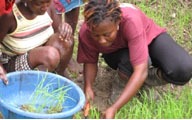
Reducing malnutrition, enhancing livelihood opportunities
RELATED NEWS
Summary
The Sustainable Nutrition and Agriculture Promotion (SNAP) Program is a Multi-Year Assistance Program (MYAP) in Sierra Leone funded by the USAID’s Office of Food for Peace. The program provides food aid to pregnant women and children under the age of two following the preventing malnutrition in children under two (PM2A) methodology. In addition to food aid, the program strengthens households with technical assistance and training in improved agricultural production, access to credit through membership in village savings and loan associations, and improved livelihood opportunities through vocational and numeracy/literacy trainings.
Project Objectives
- Reduce chronic malnutrition among children under five
- Enhance livelihoods for vulnerable people, especially women and youth
Project Activities and Approaches
- Provide monthly trainings in mother care groups and conditional food ration distribution for targeted pregnant and lactating women and children up to 23 months of age
- Engage local health services and communities with trainings and rehabilitation projects to ensure that all children under five in the rural communities where SNAP operates benefit from improved health opportunities, nutritional and hygienic knowledge, and superior family decision making.
- Conduct farmer field schools where participants receive hands-on training and demonstration plots to improve agricultural production and post-harvest handling techniques
- Form cluster groups of farmer field school graduates to receive business development, business planning, governance and gender training, and agricultural input support to engage in the cultivation of larger acreages of nutritious, high-value crops
- Develop vegetable gardens for mother care groups to promote access to nutritious for families after the end of the SNAP project
- Establish and support village savings and loan associations to promote individual and community savings in areas without access to commercial or community banks
- Provide vocational training on soap-making and gara tie-dying to expand opportunities for households to diversify their income sources
Project Results
- 31,168 vulnerable individuals have been targeted for livelihood sustainability activities
- 28,640 farmers graduated from SNAP farmer field schools; 54% of those farmers were female
- 995 farmer field schools established
- 303 farmer field school cluster groups established
- 4,670 individuals have received adult literacy, numeracy, and vocational skills training; 64% of those trained were female
Learn more about our work in Sierra Leone.
Funder: USAID/Food for Peace
Contact: Linnae Fath at lfath@acdivoca.org
Updated: 6/15





